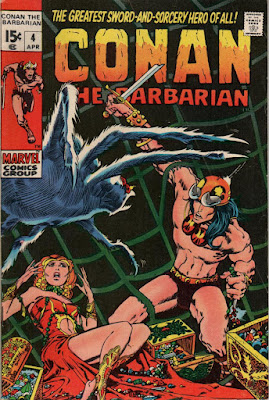The Twilight of the Grim, Grey God (#3)
- Get link
- X
- Other Apps
This issue, The Twilight of the Grim Grey God, brims with thematic richness and character development, particularly regarding Conan's evolving journey and his interaction with the enigmatic deity, Borri. Let's break it down:
Why is Conan singled out by Borri?
Conan is portrayed as a unique, defiant figure, even in a world of warriors and kings. Borri’s interest in Conan seems to stem from several key traits:
- Fierce Individualism: Conan's refusal to submit—whether to captors, enemies, or fate—makes him an outlier in a world where many succumb to despair or subjugation.
- Symbol of Change: Borri foresees the "passing of kings," signaling an era of upheaval. Conan, a barbarian with no allegiance to existing power structures, embodies the raw, untamed force that could thrive in this coming chaos.
- Destined for Greatness: Borri’s cryptic guidance implies a broader destiny for Conan, one tied to the grander struggles between gods and mortals.
Conan’s Evolution Across Issues
By this third issue, Conan is growing from a reactive figure—fighting for survival—into a man who begins to question and influence larger forces at play.
- Chains as Metaphor: Conan's chains symbolize oppression and constraint, yet he wields them as a weapon. This imagery reinforces his ability to transform adversity into strength.
- Emerging Leader: Though still fiercely independent, Conan shows glimpses of camaraderie, such as his bond with Dunlang and his decision to warn others of Malachi's treachery. These moments hint at his future role as a leader.
- Confrontation with the Divine: Borri’s towering presence forces Conan to confront the notion of higher powers manipulating mortal fates—a concept he resists, even as it looms over his path.
Borri: A Complex Deity
Borri’s interaction with Conan is pivotal. His character serves multiple narrative purposes:
- Harbinger of Doom: Borri’s declaration that "even the gods must die" underscores the transient nature of power—whether mortal or divine. This mirrors the issue's central conflict of kingdoms teetering on the edge of ruin.
- Catalyst for Reflection: Borri’s cryptic warnings compel Conan to consider his place in a larger, chaotic world.
- Symbol of Fatalism vs. Defiance: While Borri represents an inevitable tide of destruction, Conan’s very essence is to resist such inevitabilities.
Key Themes
- Mortality and Legacy: Borri’s assertion that "even the gods must die" highlights the impermanence of all things. Conan, however, strives to carve his own path in defiance of such fatalism.
- Betrayal and Honor: Malachi and Kormlada’s scheming contrasts sharply with Conan and Dunlang’s straightforward valor, emphasizing the corrupting influence of ambition.
- Barbarism vs. Civilization: Conan’s disdain for Brythunian kings who hide in their tents reflects a recurring theme of the series—barbarism as a purer, more honest way of life compared to the decadence of so-called civilized societies.
This issue solidifies Conan as more than a warrior—he is becoming a force of nature, unyielding in the face of both mortal and divine opposition. Borri’s attention underscores the idea that Conan’s path is not merely personal but symbolic of larger, epochal shifts in the Hyborian Age. The prophecy of the Grim Grey God ties Conan’s struggle to a cosmic scale, making his every decision resonate far beyond the battlefield.
- Get link
- X
- Other Apps







Comments
Post a Comment